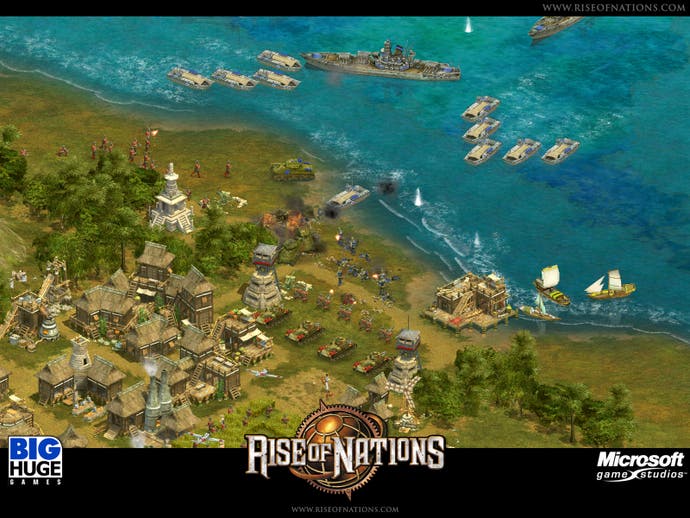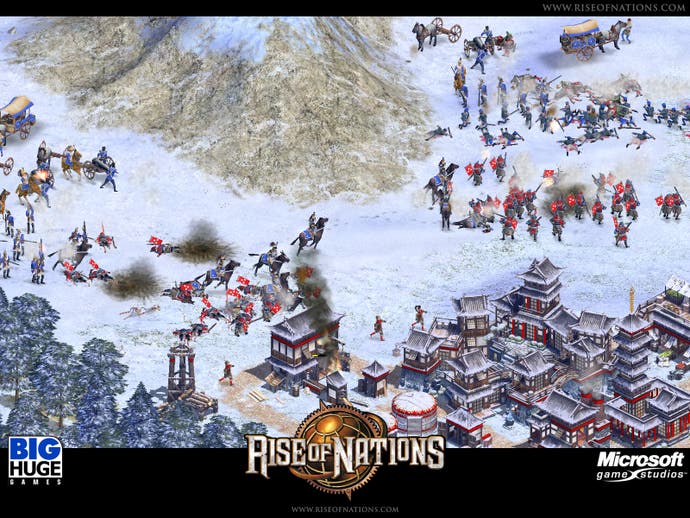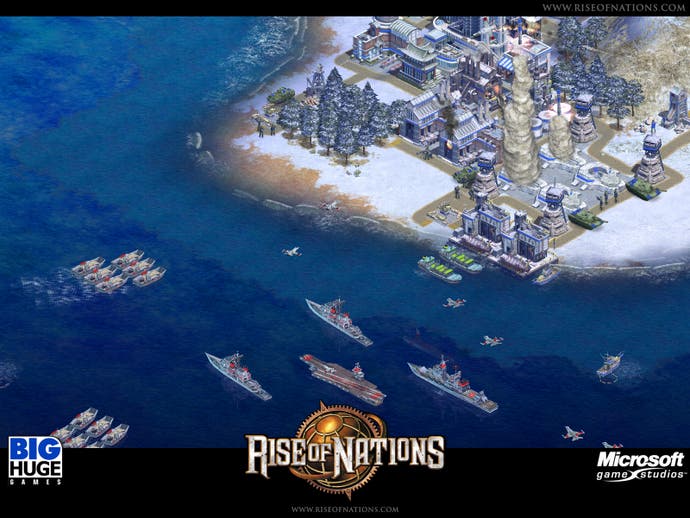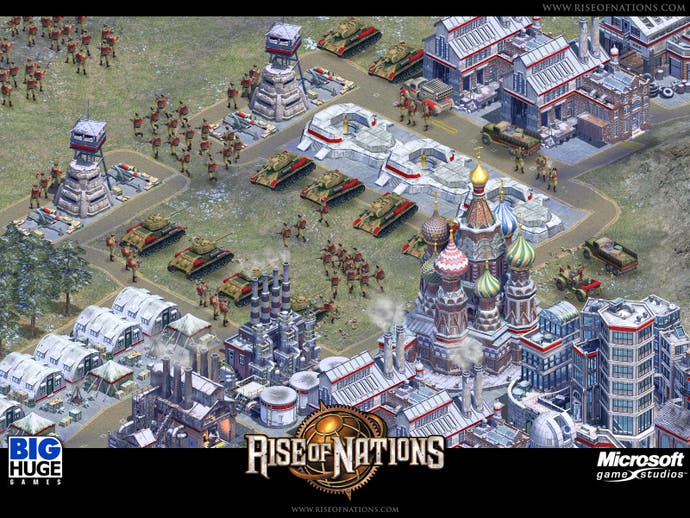Rise of Nations
Rob nuked a few people and caused armageddon. Then he ate a biscuit.
If you're a game developer who fancies making something a bit innovative for your next project, one of the most tried and tested routes to this goal is by combining two well established genres into a single game, hopefully bringing the best of both worlds to the mix. It's a hit and miss approach, but the hits can certainly be worth the effort - Deus Ex, at heart, is just a combination of first person shooter gameplay and RPG mechanics.
Rise of Nations is another game which aims to combine two genres, in this case, high speed real-time strategy gameplay and hardcore turn-based strategy mechanics. It's an interesting concept, and the team behind it makes it all the more interesting - lead designer Brian Reynolds was one of the key figures behind Civilization II and Alpha Centauri, and hence this debut title from new studio Big Huge Games brings a certain weight of expectation with it.
Age of Civilization

Anyone who has played Age of Empires will feel instantly at home with the military aspects of the game, which takes most of its inspiration as a real-time strategy title from the AoE series. Also lifted from Age of Empires is the concept of Ages, with your nation going through major upgrades as you complete enough research to progress to the next age. Like AoE, you can watch as all your settlements and units are automatically upgraded with each progression through the ages - although the scope here is rather larger, spanning everything from the ancient civilisations through to modern day cities and military capabilities (the Information Age, according to the game).
It's about there that the similarity to Age of Empires ends, and the similarity with the Civilisation or Alpha Centauri games begins. Your nation is made up of cities and other settlements, which are connected (eventually) by tracks and roads; each city has a variety of structures which can contribute to research, build new units, or provide resources through farming, woodcutting, mining and eventually even through drilling for oil or extracting uranium ore (the range of resources available becomes wider as you progress through the ages).
Cities serve another important purpose - they exert influence over your national borders, elastic lines which stretch across the map and delineate your territory from that of your neighbours. Certain structures and types of research can make your influence over the borders stronger, thus extending your territory further, and building forts or castles near the border also extends your influence (as well as providing a place where you can garrison troops in order to replenish their health).
On The Borderline

Borders play a very important role in Rise of Nations. Essentially, anything within your borders is yours - in particular, resources and "special" resources, which are another concept borrowed from Civilisation. These can take the form of herds of animals, gem mines, cotton fields - there are plenty of different types of special resources, and any of them can be exploited by means of sending a merchant unit off to set up shop beside the special resource marker on the map. Of course, there's nothing to stop you from sneakily popping over the border and setting up a merchant stall on your enemy's resources, but the chances are he won't last very long there.
Each resource provides a different set of bonuses to your nation, either in terms of making certain types of unit cheaper, or faster to produce, or increasing the strength of your building walls, or giving bonuses to food production... You get the picture. This provides a unique element to the gameplay, because although each playable nation in the game has its own special units (such as Samurai for the Japanese, for example) and certain bonuses in different areas, the resources you annex throughout the game will fine-tune the strengths of your nation so that each engagement is slightly different from the last.
The other vital role played by borders in the game is, as you might expect, a military one. Troops acting within their own borders are considered to be constantly resupplied, while any troops running around in enemy territory without a supply unit accompanying them are in a much weaker position. In effect, this gives a major bonus to the defending side in any invasion - just as you'd expect, really. It's an excellent way of including some element of the importance of supply chains in real combat in the game, without actually including an excessively complex model for the supply chains themselves.
The KISS Principle

That, in fact, is a core triumph of Rise of Nations in a number of respects - the game successfully integrates a number of very complex systems into its gameplay without ever overwhelming the player with detail or micromanagement. Each of your cities is a relatively complicated beast, and it would be easy for the game to throw economy, research and construction options at you - but instead everything is kept relatively simple, and although you can micromanage the whole affair by yourself if you desire, left to its own devices the game will make sensible choices about the running of the cities by allocating idle villagers to go and work where they're needed.
The research model of the game is similarly simplified, and sees you researching broad topics rather than specific items - a bit of a step down from the complex technology tree found in Civilisation, but a necessary one given the different focus of Rise of Nations. Everywhere in the gameplay, sensible decisions like this can be found - simplifications or automated systems which smooth over the potential difficulties of integrating a full-strength nation building game with a high speed real-time strategy game.
High speed it certainly is, as well - Brian Reynolds was right when he said that you could play this game in a lunchtime, because we've had several multiplayer games that have gone on for significantly less than two hours (what? You don't get two-hour lunches? For shame!) - which is really very fast given the style of gameplay in Rise of Nations. Advancing through the ages happens a lot faster than in Age of Empires, and battles remain interesting the whole way through the game - the defensive bonuses mean there are few foregone conclusions, and genuinely good tactics are often called for during engagements. In fact, the only outstanding criticism we have of the game (aside from a couple of crash bugs we experienced while playing it) is that perhaps the game makes it a little too tricky to pull off tactical moves, with frantic mouse clicking required in combat to get your units to perform flanking manoeuvres and the likes. A little of the attention to detail lavished on the rest of the interface would not have gone amiss here.
As the scenario approaches endgame, all sides get their hands on modern technologies such as cruise missiles, stealth bombers and nuclear weapons - but the game has some clever restrictions on their usefulness, which means there's really no such thing as a genuine superweapon in Rise of Nations. Nuclear weapons are devastating, but if too many of them are used, it's game over because you've just triggered Armageddon (oops!), so they're to be used as last ditch weapons only. Long range bombers and missiles are great, but once you've weakened a city, you need to occupy it with your troops for a number of minutes before it actually becomes yours, which means that they can only be used as part of a wider strategy.
Same thing we do every night, Pinky...

One of the most interesting aspects of Rise of Nations is the Conquer The World mode, which gives you control of a nation on a Risk style board and allows you to fight engagements against enemies in order to take over their territories, with the ultimate goal of - you guessed it - ruling the world. It's an excellent substitute for a linear campaign mode, although we're a little disappointed at how simple the turn-based boardgame play is - it's frankly not a patch on the depth of something like Medieval: Total War, but then again, it's not really meant to be.
The game advances through the ages every few turns when in Conquer The World play, and before each real-time scenario is played, you may have the chance to bolster your forces or cripple your enemy using special cards purchased with the tribute you've been paid by captured territories. This mode also provides an excellent tutorial for the game as a whole, because it only introduces new research and technology to you gradually as you advance through the ages and move across the world map.
Graphically, Rise of Nations is very nicely done - it can't really live up to the 3D graphics of something like WarCraft III or WW2: Frontline Command, but it's still a good looking game and there's plenty of variety in the units and buildings, as well as a decent selection of weapon effects. The use of audio in the game is also good, with a stirring soundtrack and plenty of dynamic sounds providing good feedback about what's happening on the map at the moment.
A Nation Once Again
Rise of Nations is one of the most impressive strategy games we've seen in years - and as you may have noticed, we've seen rather a lot of strategy games recently, so that's no idle compliment. The graphics and audio of the game are functional and perfectly pleasing, but it's the gameplay and design that deserves massive credit. Brian Reynolds and his team at Big Huge Games have successfully crafted an innovative and massively enjoyable strategy title that incorporates many of the best elements of two well-loved genres, namely RTS and the turn-based God Game, and this combination has yielded one of the most accessible, playable and deep strategy games of all time. It's not entirely flawless, and we were disappointed that some crash bugs remained in the final version of the game, but right at the moment, no other strategy title on the PC rises above.

